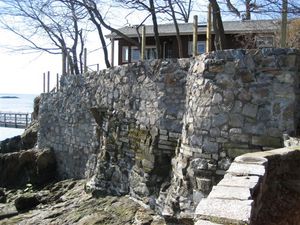Rye Rules Hen Island Seawall Must Come Down
LOHUD.COM – Theresa Juva
February 16, 2010
RYE – A Hen Island resident will have to tear down a 16-foot stone seawall that was built without permits several years ago.
 The Planning Commission this month refused to retroactively approve the structure, which city officials said hasn’t been properly tested for safety and violates federal, state and local laws.
The Planning Commission this month refused to retroactively approve the structure, which city officials said hasn’t been properly tested for safety and violates federal, state and local laws.
Hen Island is a 26-acre private island of summer cottages near Milton Harbor. It is owned by Kuder Island Colony, a group of 34 shareholders.
Cottage resident Joann Molloy said she expanded a smaller wall on the property in 2006 after a fence fell down from beach erosion. She was concerned the rock underneath her cottage would also erode.
“I was not aware I needed a permit,” Molloy said. “When I found out I needed them, I immediately began proceedings to obtain them.”
The city slapped the property with two violations in 2007 and 2008 before Kuder Island Colony applied for a retroactive permit last year, according to documents.
The Planning Commission ruled that because the structure was already built, officials couldn’t determine if the wall was necessary.
“Constructing a substantial 16-foot-high wall that resulted in a 230 percent increase in the length of the existing wall and then seeking permission from the Commission after-the-fact denies the Commission the opportunity to consider alternatives as required by law and sets an undesirable precedent,” the commission wrote in its decision.
Molloy said she isn’t sure what she will do now.
“My main concern is that the house is built on the rock and the taking down of the wall will have a major impact on the environment and could seriously cause problems in the rock,” she said.
City planner Christian Miller and Planning Commission Chairwoman Barbara Cummings did not return phone messages. Kuder Island president Ben Minard also did not return a call seeking comment.
Violations have been found on the island before. City inspectors last year found cottages with foundation problems and improperly stored propane tanks near shrubs that could spread fire.


